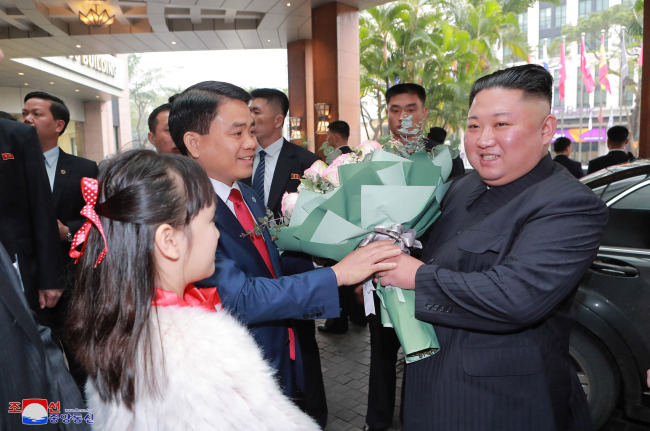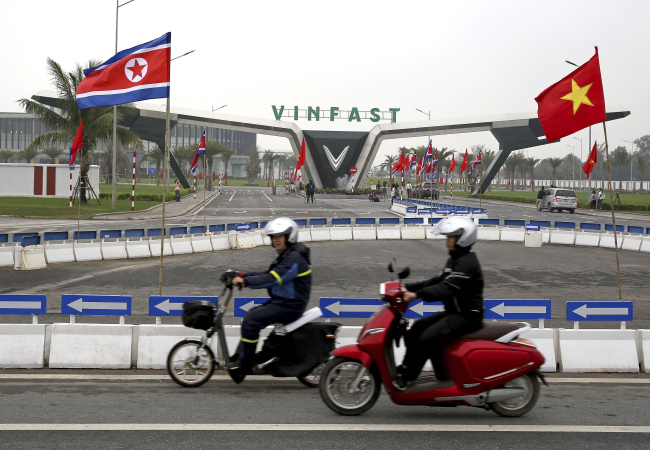[New Focus] NK eyes Vietnam’s economic reform model
By Jung Min-kyungPublished : Feb. 27, 2019 - 16:22
North Korea has taken the Hanoi summit between US President Donald Trump and its leader Kim Jong-un this week as an apt opportunity to express its interest in Vietnam’s market reform of “doi moi,” amid divided opinions among experts here whether the economic model “fits the mold.”
Vietnam, a socialist nation, is often remarked for its economic development, after it successfully promoted a slew of market-oriented reforms in the 1980s and ’90s, recuperating from the damages of the 1954-75 Vietnam War. It managed to recover its diplomatic and economic ties with the US while maintaining its communist dictatorship -- which is likely what Kim Jong-un is aiming for.
As Kim geared up to meet Trump -- their first encounter of the summit was scheduled Wednesday evening -- a team of North Korean officials, including O Su-yong in charge of the Workers’ Party of Korea’s economic affairs, stopped by Ha Long Bay, a popular tourist destination east of Hanoi, before heading to Hai Phong, a major port and industrial city in northeastern Vietnam.

The officials were expected to inspect businesses run by Vietnamese conglomerate Vingroup and factories of VinFast, a key automotive manufacturer located in Hai Phong.
North Korea has established more than 20 special economic zones in recent decades but has struggled to attract foreign investors.
Trump, meanwhile, held a meeting with Vietnam’s top officials around noon where he stressed that his North Korean counterpart could use the Southeast Asian nation as a model for economic revitalization, according to the Associated Press.
“If you look at what you’ve done in a short time, he can do it in a very, very rapid time -- make North Korea into a great economic power,” Trump told the officials.
Also in line with the summit, the North’s state-run daily Rodong Sinmun released an article titled “Vietnam pushing for economic development” early in the day, lauding Vietnam’s capability of facilitating simultaneous growth of socialism and economy.
“Today, Vietnam‘s ruling party and the government are elevating its role (within the nation) while striving for economic reform and strengthening the socialist regime simultaneously,” it read in Korean.
It noted that Vietnam has overcome the economic aspect of being heavily reliant on the agricultural sector and is pursuing a slew of industrial projects that will complete its economic balance.
Despite North Korea’s hopes and dreams to create a virtuous cycle between its socialist dictatorship and economic growth, however, several experts have been ruling out doi moi as a plausible option for the isolated nation.
“On the surface doi moi may seem like what North Korea wants, but the model promotes opening up its market to capitalism, which could break down the current regime,” Kim Byung-yeon, a professor of economics at Seoul National University, told The Korea Herald.
Analysts like Kim Byung-yeon have pointed out that the doi moi model was pursued following the reunification of Vietnam in 1975, claiming that opening up the market could increase the risk of “reunification of absorption” by South Korea for the North.
The Seoul-based expert also raised the possibility that the North may be merely trying to showcase its interest in the reform model -- with Trump repeatedly nudging Pyongyang to follow Vietnam’s path -- as an attempt to alleviate layers of sanctions standing in the way of its economic development.
“North Korea has been studying the doi moi model for decades -- it’s not a new subject for them to study and there is a chance that it may be making such visits to showcase their willingness to listen to the US’ thoughts,” he added.
With sanctions continuing to stand in the way, the main agenda item of the Trump-Kim meeting is negotiations on the denuclearization of the North, which is more directly involved with the isolated nation’s goal of lifting sanctions, analysts noted.

“It seems Kim Jong-un is more focused on preparing for the meeting at the moment, but there is a chance he may visit economic zones and facilities after the summit,” said Shin Beom-chul, a senior fellow at the Asan Institute for Policy Studies.
Inter-Korean economic cooperation
The second Trump-Kim meeting has fueled hopes within South Korea that a possible sanctions alleviation could be reached as an outcome, creating momentum for progress in inter-Korean economic cooperation.
According to Hong Nam-ki, the South’s minister of economy and finance, Wednesday, the Seoul government is currently “checking relevant matters behind the scenes” regarding progress in economic cooperation in case the summit creates the right conditions for sanctions alleviation. He added that progress will contribute to the rejuvenation of the South Korean economy, without elaborating as to what the “relevant matters” were.
State think tank IBK Economic Research Institute announced earlier this month that the two Koreas’ collaboration would bring about economic benefits worth 379.4 trillion won ($312 billion) for two decades.
Though Kim Jong-un has yet to visit a Samsung Electronics factory in Vietnam’s Bac Ninh province, expectations persist he may visit the factory or other facilities of South Korean companies in the vicinity soon.
Despite test operations of cross-border railways running along both the east and west coast of the Korean Peninsula late last year, inter-Korean economic projects have failed to make dramatic progress so far.
A poll by research firm Realmeter on Tuesday, conducted on 505 adults across South Korea, showed that 33 percent picked the reconnection and modernization of inter-Korean railways as a key cross-border project that the Seoul government should pursue.
There was a surge in share prices of North Korea-related businesses on the Seoul bourses Wednesday, with the stocks buoyed by the Vietnam summit.
“There is a chance that local businesses might enter the North Korean market if a successful result is reached at the summit and that could create momentum for such projects,” said Lim Eul-chul, a professor at Kyungnam University.
By Jung Min-kyung (mkjung@heraldcorp.com)


![[Exclusive] Korean military set to ban iPhones over 'security' concerns](http://res.heraldm.com/phpwas/restmb_idxmake.php?idx=644&simg=/content/image/2024/04/23/20240423050599_0.jpg&u=20240423183955)



![[Herald Interview] 'Amid aging population, Korea to invite more young professionals from overseas'](http://res.heraldm.com/phpwas/restmb_idxmake.php?idx=644&simg=/content/image/2024/04/24/20240424050844_0.jpg&u=20240424200058)


![[Pressure points] Leggings in public: Fashion statement or social faux pas?](http://res.heraldm.com/phpwas/restmb_idxmake.php?idx=644&simg=/content/image/2024/04/23/20240423050669_0.jpg&u=)









